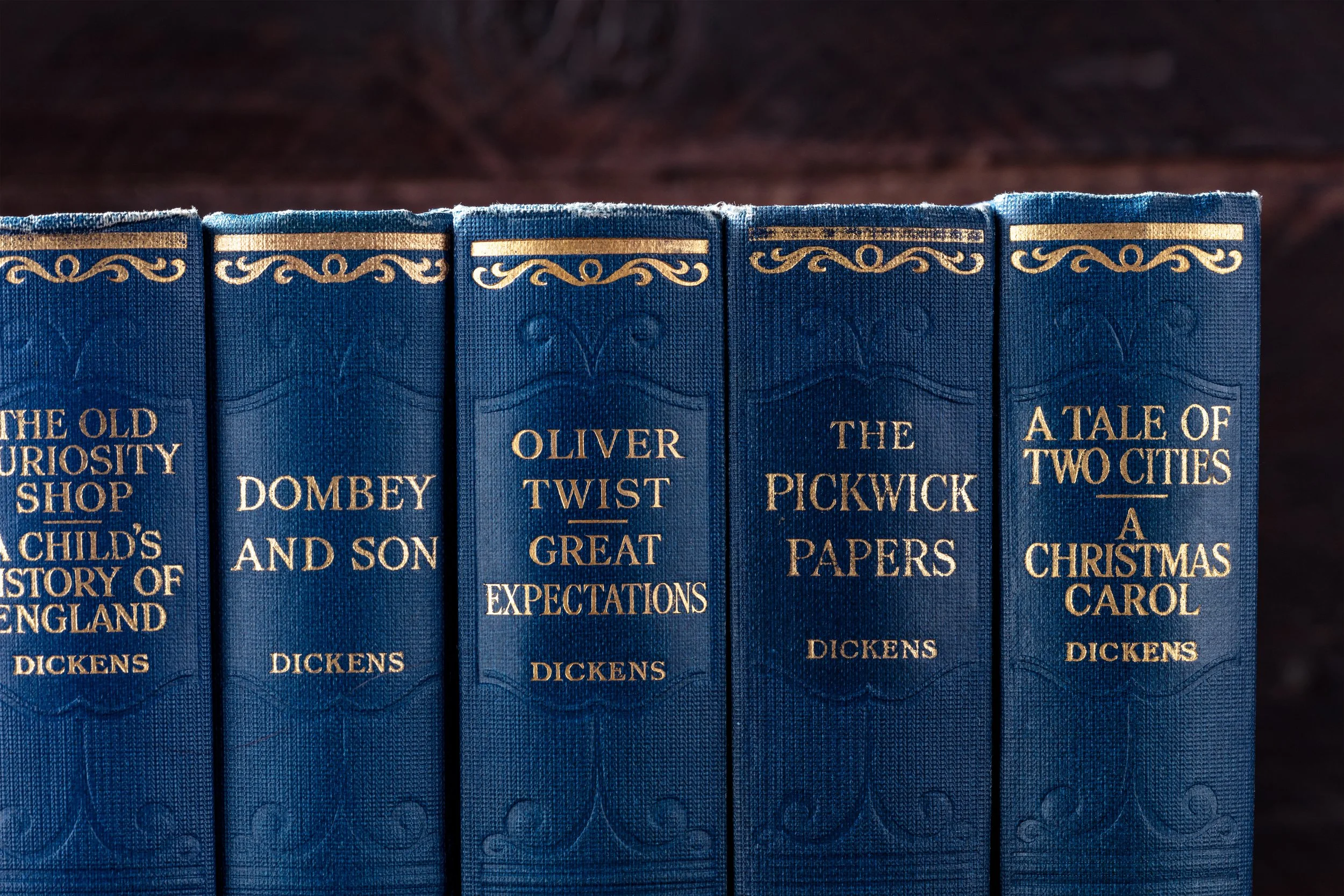How Charles Dickens Shaped Our Stories: A Personal Reflection on a Literary Legend
Hello, fellow lovers of stories and words! As the owner of Novus Publishing House, I’ve always believed that literature is a gift: a bridge connecting us across time, culture, and experience. And today, I want to talk about one of the greatest storytellers to ever wield a pen: Charles Dickens. Now, I know what some of you might be thinking. Dickens can seem daunting, especially if you first encountered his work as a young person and struggled to see past the Victorian jargon and long-winded descriptions. I’ve been there. But trust me, Dickens’ stories are worth every effort. They’re like a rich, hearty stew, sometimes challenging to get into, but absolutely nourishing for the soul.
A Dickensian Journey: From Confusion to Admiration
When I first tried reading Dickens, I felt overwhelmed by the sprawling sentences, the Dickensian dialect, and the sheer number of characters. It was as if he was deliberately trying to test my patience and perhaps my sanity! But over time, I realized that Dickens was doing something much more important: he was holding up a mirror to society, showing us both its beauty and its ugliness. His work is layered, full of social commentary, humour, heartbreak, and hope.
My personal favourite Dickens book? ‘A Christmas Carol.’ I adore it. In my house, it simply isn’t Christmas until I’ve watched the film adaptation, preferably the one with Alastair Sim. Dickens captured the true spirit of giving, redemption, and hope, wrapped in a story that’s as fresh today as it was in 1843. I firmly believe if Dickens were alive today, he’d be an influencer; Instagram stories about kindness, hashtags about social justice, and a penchant for calling out the “Bah, humbug!” in all of us.
But aside from my personal favourite, ‘A Christmas Carol,’ I’ve also loved ‘Great Expectations’ for its profound themes of love and rejection, wealth and poverty, and the eventual triumph of good over evil. Dickens had this incredible way of making you root for the underdog, care about the lost souls, and believe that no matter how dark things seem, there’s light at the end of the tunnel. His stories aren’t just entertainment; they’re lessons wrapped in captivating plots. As Dickens himself said, “The most important thing in a story is that it should be true to life.” And that truth still resonates with me today.
Dickens’ Enduring Impact on Modern Literature
You might wonder, ‘What makes Dickens so influential that his work has stood the test of over 200 years?’ Well, for starters, Dickens was a master storyteller. His characters are so vivid and real that they’ve become archetypes: think of the virtuous little Oliver Twist, the miserly Ebenezer Scrooge, or the kind-hearted Pip. These characters continue to inspire writers, filmmakers, and playwrights today, nearly 200years beyond their literary invention.
But Dickens did something more than craft compelling characters. He used storytelling as a tool for social change. His vivid portrayals of poverty, injustice, and corruption sparked conversations that led to reforms. And that’s a lesson that remains relevant in 2025: stories have the power to move us. They can challenge the status quo, inspire empathy, and motivate people to take action. As Dickens famously wrote, “No one is useless in this world who lightens the burdens of another.” That’s the heart of storytelling: lifting others up.
Modern writers have borrowed Dickens’ love for social commentary. Consider how contemporary authors address issues like inequality and environmental crises; these are the modern-day counterparts of Dickens’ social conscience. His influence runs so deeply that even in the age of social media, the call for justice and compassion echoes his call to “mind the gap” between rich and poor.
Timeless Lessons from Dickens That Still Resonate
Here are a few that I’ve carried with me…
The Power of Compassion: Dickens believed that kindness could change lives. His characters often find redemption through acts of generosity and understanding. As Dickens said, “No one is useless in this world who lightens the burdens of another.” His stories remind us that compassion is a revolutionary act, and one that can heal and transform. I’d love to see humans around the world apply this wonderful lesson and show compassion and care in a way that creates ripples of change globally. How are you showing compassion today? Is it enough?
The Importance of Hope: No matter how bleak the circumstances, be it poverty, rejection, or loss, Dickens’ stories often end with a note of hope. "It is a fair, even-handed, noble adjustment of things, that while there is misery in the world, there is also joy.” ‘A Christmas Carol’ is a perfect example: even the most hardened Scrooge can change, and that’s a lesson I hold dearly. Hope isn’t just for fairy tales; it’s a vital ingredient in real life. What are we without hope?
The Value of Storytelling for Change: Dickens knew that stories could move hearts and minds. Today, with our endless scrolling and noise, I think we need stories more than ever: stories that challenge, uplift, and unite us. As Dickens said, “What greater gift than the love of a story?” And where would we be without love? To me, love is the foundation of all that is human.
The Complexity of Humanity: Dickens refused to paint his characters in black and white. Instead, he showed us the grey areas; people are complicated, and goodness often coexists with flaws. This lesson reminds us to approach others with grace and understanding. Wouldn’t the world be a better place for knowing, understanding and embracing this powerful lesson? If only…
If Dickens Were Blogging in 2025
I saw your eyebrows rise at reading that subtitle, which gives me a moment to smile! But just imagine Dickens, still wielding his pen, but now with a smartphone in hand. I’d bet he’d be the type to post a witty tweet about social injustice, or a heartfelt Instagram story about kindness; something like, “A little compassion goes a long way. #HumbugNoMore.”
He might even start a TikTok dance to raise awareness about poverty, because if there’s one thing Dickens loved, it was stirring up a little mischief to shake up the status quo. I can see him now - he’d be tapping his well-worn walking stick to the beat of ‘Unstoppable’ by SZA, an anthem of resilience that echoes his own enduring lessons. For Dickens, the song’s chorus: ‘I’m unstoppable, I’m unbreakable,’ would surely resonate with the spirit of his most beloved characters, who, despite facing hardship and rejection, press on with unyielding hope.
He might chuckle and say, ‘As I have often observed, “Do not be discouraged by the obstacles in your path, for they are but the shadows cast by the light of your own perseverance.”’ And perhaps, inspired by the song’s empowering message, Dickens would declare, ‘In the grand story of life, we are all authors of our own destiny, undaunted by the storms, unshaken in our resolve, and forever moving forward, much like the resilient characters I’ve had the pleasure to write about.’
So, I imagine Dickens, with a twinkle in his eye, giving in to the rhythm, and perhaps, just perhaps, performing a spirited “Unstoppable” dance - be it a jig, a twirl, or a hearty stomp, because even in the Victorian era, he knew the importance of hope, resilience, and a good, hearty jig to lift the spirits.
He’d probably be a bit cheeky, too. Perhaps he’d post, “Writing stories since 1812; still cheaper than therapy,” or “If you think my characters are exaggerated, wait until you see your relatives at the family reunion!” Dickens, after all, was never shy about poking fun at societal absurdities. I think I’d be his biggest social media fan!!
A Personal Reflection and Invitation
For me, Dickens’ work is a reminder that stories are powerful tools for transformation: both personal and societal. His characters, themes, and social critiques continue to inspire me as a publisher, writer, and lover of literature. They remind us that even in the darkest times, hope and kindness can prevail.
And I want to encourage you, whether you’re a seasoned reader, a budding writer, or someone just beginning to explore the magic of stories, to dive into Dickens. His books will challenge you, make you laugh, cry, and think. They’ll remind you that our stories, no matter how old, are still relevant and vital. Take your time to explore his amazing works and embrace the lessons he teaches.
So, next time you feel overwhelmed by the sheer scope of Dickens, remember: every great story is worth the effort. And if Dickens could survive those long Victorian sentences, I believe we can survive anything, especially the occasional “humbug” in our own lives.
Let’s keep reading, keep writing, and keep believing in the power of stories. Because in the end, Dickens didn’t just write about society, he helped shape it. And I believe his legacy will continue to do so for generations to come.
As I write my final words on this page, I trust you’ll carry these stories, these little sparks of hope and humanity, within your own heart, ready to ignite anew whenever the world seems dark. Remember, every story you tell, every word you read, adds a stitch to the great tapestry of life; a tapestry that, with patience and kindness, shall never be unravelled. As Dickens wisely declared, ‘There is a wisdom of the head, and a wisdom of the heart,’ and I hope your journey with stories continues to nourish both. So, go forth and write your story, read with passion, and let your life be a testament to the enduring power of hope, humour, and the human spirit.
Mandy x
Please note: Whilst this is a genuine review, not an advertisement, some of the links to the books are affiliate links. This means you won’t pay anything extra, but we may earn a small commission if you make a purchase through them. This helps support our work and keeps our content free. Thank you for your support!

